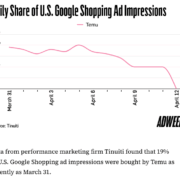Temu pulled its ads – here’s what happened next

Chinese ecommerce giant Temu was a dominant force in paid acquisition across Google, Meta, and other platforms – until mid-April, when it abruptly halted all U.S. advertising.
This was a stunning move from one of the internet’s most aggressive spenders. Temu’s sudden absence opened up a flood of ad inventory – and with it, new questions: Who won? Who lost? And what does it say about market dynamics?
The impact on the digital ad ecosystem was immediate and profound, based on research by Mike Ryan, head of ecommerce insights at Smarter Ecommerce.
Catch up quick:
- Over three days in April, Temu’s Google Shopping impression share collapsed, signaling a total pullback.
- The company’s iOS app ranking nosedived from the Top 3 to No. 46 within 48 hours – even before every ad was fully shut off.
- By April 30, Temu’s app had fallen out of the Top 100 entirely.

What the data shows. Ryan did a review of daily auction data from January through three weeks post-Temu. His findings reveal:
- SMBs saw little to no boost in visibility or impression share.
- Large retailers and marketplaces absorbed the lion’s share of newly available impressions.
The winners. The biggest beneficiaries of Temu’s exit include:
- Etsy (perhaps the single biggest winner, reportedly gaining as much as 20 percentage points in some categories)
- eBay
- Target
- Walmart
- Kohl’s
- Shop app (Shopify)
- Best Buy
- Dick’s Sporting Goods
The intrigue. Despite its massive footprint, Amazon didn’t emerge as a major beneficiary.
Why we care. Temu’s exit from digital advertising shows how visibility gets reshuffled. When a top spender drops out, the extra exposure goes to the biggest, most aggressive advertisers, making it even harder for smaller players to compete.
Bottom line. Temu may have shaken up the market with its aggressive ad spending, but it also helped set the rules of the game. Now that it’s gone, we can see just how much control the biggest advertisers have, and how hard it is for smaller players to rise when one of the giants leaves the field.


